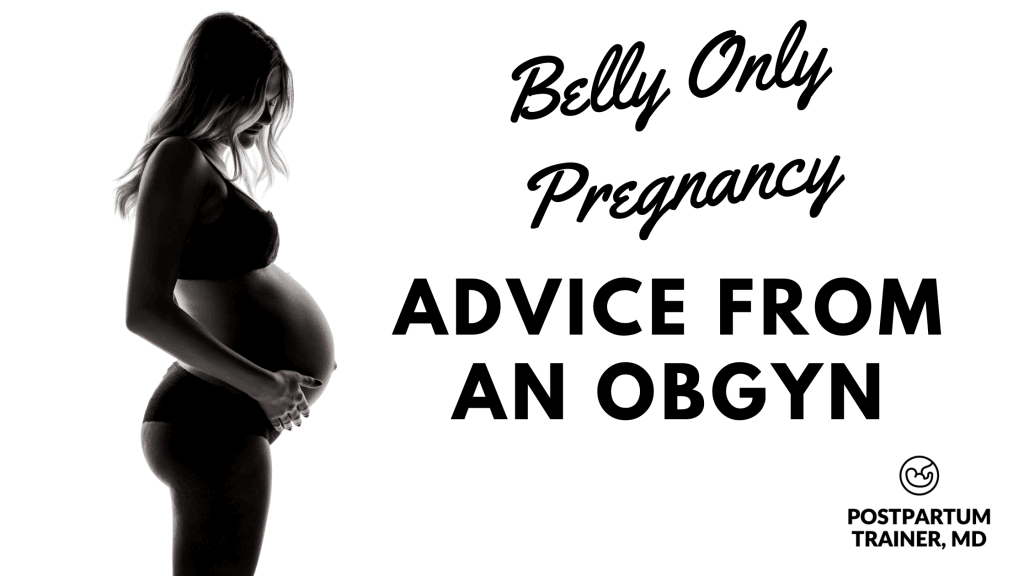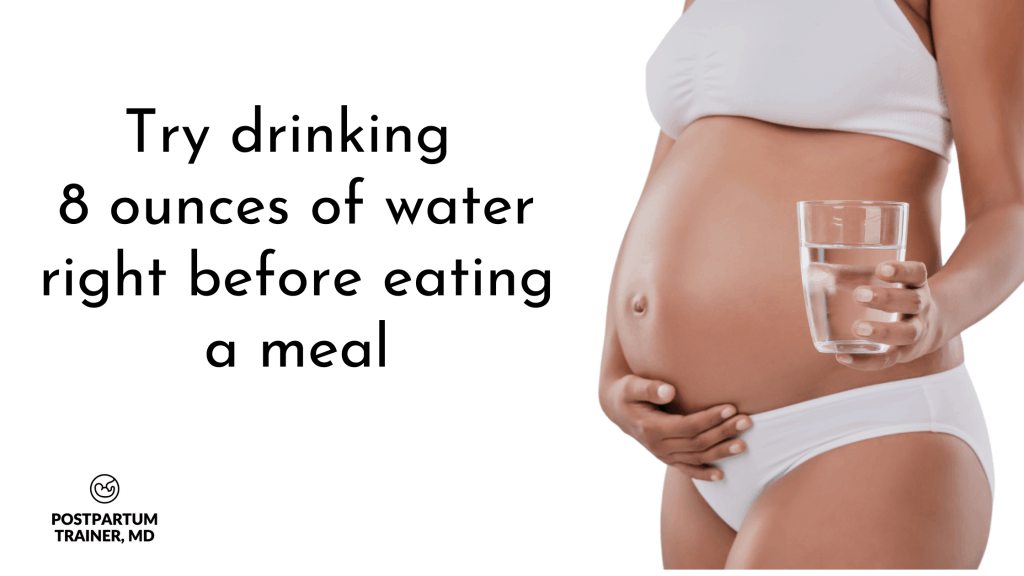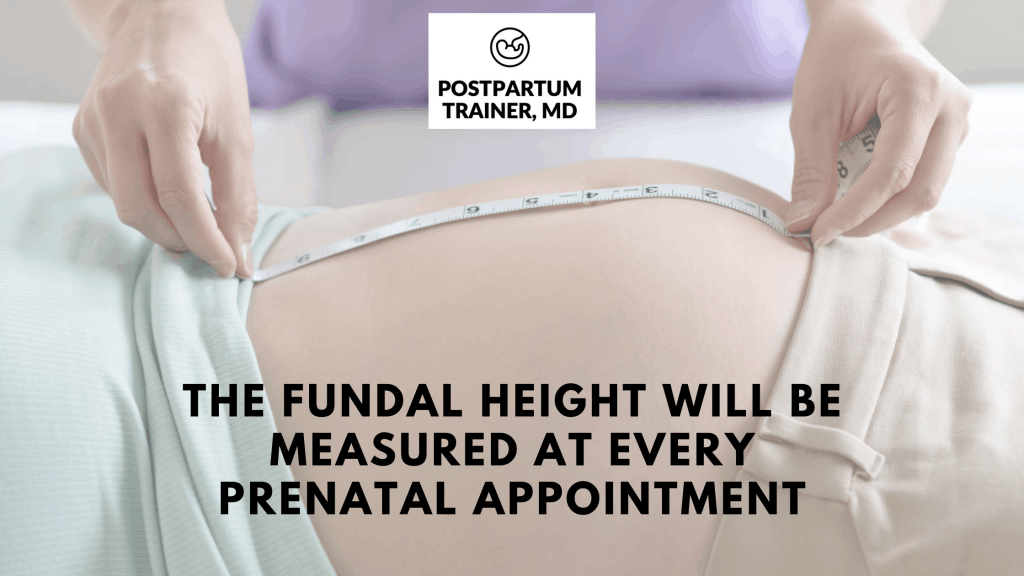Are you wondering if it is possible to have a belly only pregnancy?
Unfortunately, it may not be possible for everyone as weight gain during pregnancy is influenced by a variety of factors like genetics and your lifestyle.
With that said, in this post, I will give you tips on how to optimize your chances of having a belly only pregnancy.
Let’s get started.

Is it possible to have a belly only pregnancy?
Okay first, let’s define the meaning of a belly only pregnancy.
A belly only pregnancy means the majority of the weight you gain comes from the baby, the placenta, and the amniotic fluid,
So essentially, you only gain weight in your belly and not in your arms, legs, or butt.
Unfortunately, not everyone will be able to have a belly only pregnancy. It is very difficult and unrealistic to try and gain no weight anywhere else.
But that’s okay.
Gaining weight in pregnancy is normal and healthy!
*Your priority should be a healthy pregnancy and a healthy baby.*
I repeat. Healthy mom, healthy baby. That should be your goal.
With that said, there are things that you can do to try and achieve a HEALTHY, belly only pregnancy.
Let’s go over them now.
5 Things To Try & Optimize For A Belly Only Pregnancy
1. Don’t eat for two
How many times have you heard another woman tell you “it’s okay you’re pregnant- just eat it.”
Please do not fall for this trap.
In the first trimester, you actually don’t even have to increase your caloric intake at all!
The worst part is, you might not even have much of an appetite at all if you struggle with nausea / morning sickness.
It is not until you reach the second trimester where you should increase the number of calories that you eat.
Keep in mind that your baby is still very small relative to you. You only need to increase your caloric consumption by a small amount in the 2nd and 3rd trimesters.

Something to the tune of 300-500 calories.
That’s not much. This is the equivalence of a small snack!
So please do not eat for two.
2. Establish staple foods to include in your diet
Pregnancy is a crucial time for everyone.
It is important that you establish an eating pattern that will provide nutrients for yourself- and for your developing baby.
Eating highly processed foods loaded with added sugar will only increase your risk of:
- excessive weight gain,
- poor energy, and
- the development of gestational diabetes and all the problems that come along with it.
That’s not to say that you can’t indulge in some cravings from time to time.
Rather, it is important that you focus on consuming the best nutrients possible the majority of the time.
This means consuming sufficient amounts of high-quality proteins, complex carbohydrates, and healthy fats. Plus, you need to make sure that you are getting an adequate supply of all the key micronutrients your baby needs to thrive.
I go over all of these nutrients in more detail in my Fit Pregnancy Diet post.
3. Find a way to burn calories
One of the best ways to minimize fat gain in pregnancy is controlling food intake. But it’s also beneficial to establish an exercise routine that you can follow consistently.
Exercise is proven to be safe and beneficial for pregnant women and will improve your chances of having a belly only pregnancy.
The way in which exercise does this is by helping to build lean muscle tissue and by burning fat for energy.
This is a key strategy in minimizing any amount of extra weight gain in pregnancy.
However, it is important that you receive clearance from your OBGYN physician prior to beginning any sort of exercise routine.
There are plenty of ways you can exercise in pregnancy which includes:
- Cardio
- Yoga
- Pilates
- Bodyweight Training
- Resistance Training
The most important thing is consistency.
Find an exercise activity that you enjoy, and that you can stick to for the long term.
I will give you an example later on.
4. Drink plenty of water
Water consumption is another great strategy to help decrease your chances of overeating and excessive calorie consumption.
Water can help improve your satiation and help your body stay energized so that you can remain active.
Plus, some research shows that water can have a thermogenic effect on your body – helping you burn extra calories at rest.
So how much water should you drink per day?
Try to drink around 6 glasses of water per day.
You can do this by:
- Drinking a tall glass of water immediately upon awakening
- Drinking a tall glass of water before breakfast, lunch, and dinner, and
- Drinking a tall glass of water a few hours before bedtime.

To determine if you are drinking enough water, you could take a look at your urine.
You want your urine to be a pale yellow color.
If your urine is dark yellow, you need to drink more water!
If your urine is clear and colorless, you are drinking too much water.
5. Maximize the amount of sleep you get
Sleep deprivation is real and could have significant lasting effects on your body.
What you may not know is that sleep deprivation is highly associated with weight gain and body fat retention.
As you know, sleep is the time for many crucial processes in your body to take place.
If you do not sleep, your body is in a constant state of stress, which doesn’t allow your parasympathetic nervous system to function appropriately. This constant state of stress causes the release of hormones that leads to elevated blood sugar levels, insulin resistance, and weight gain.
Furthermore, your metabolism is also affected by sleep deprivation.
You ever notice what your appetite is like after not sleeping?
Whenever I do a 24-hour shift at the hospital I am ravenous!
So don’t skimp on sleep if you want to increase your chances of a belly only pregnancy.
The Belly Only Pregnancy Plan
The belly only pregnancy plan includes:
- maintaining an exercise routine,
- consuming a healthy diet, (which I go over in my Fit Pregnancy Diet)
- drinking plenty of fluids,
- maximizing your sleep, and
- going to all your prenatal appointments.
Ideally, you want to exercise as much as you can realistically keep up with.
I find it easy to do 30-minute blocks, as this isn’t a huge time commitment and it’s enough time to get a great workout in.
If 30 minutes is too much, find something that you can stick to.
Can you do 20 minutes a day, at least 4 days a week?
What about 15 minutes a day, 6 days a week?
Consistency is the most important thing.
My recommendation is that you incorporate a combination of low-intensity cardio with functional strength training
Here’s how.
Sample Healthy Pregnancy Workout
In this workout, it is important that you focus on strengthening:
- your legs,
- your upper back,
- the pelvic floor,
- and your abdominal muscles (core).
Here is an example:
| Exercise | Sets | Repetitions |
|---|---|---|
| Sumo Squats | 3 | 12 |
| Seated Banded Rows | 3 | 12-15 |
| Standing Posterior Pelvic Tilts with Kegel Contractions | 4 | 8-10 |
| Modified Side Plank | 4 | 30 seconds |
Here is what each exercise looks like:




You can do some variation of this workout at least 2 times per week.
Sample Low-Intensity Cardio Routine
As for the low-intensity cardio, all you have to do is go on a brisk walk at least 3 times per week on the days where you aren’t strength training.
Here is a sample walking routine you can follow.
- If you are a beginner, start by walking 10-15 minutes per day, 3-4x per week.
- If you have been walking throughout the first trimester, you can do 20-30 minutes per day, 3-4x per week.
- Alternatively, you can do 15-20 minutes per day, 2-3x per week.
I go over this in a lot more detail in my post on Walking In Pregnancy if you want to learn more.
Other Related Questions
Is it normal to have a small pregnant belly?
It can be normal to have a small pregnancy belly if you yourself are small. This is especially true if the father of the baby is also small.
However, a small pregnant belly can also be a sign of growth restriction.
This is why we always measure your belly at every prenatal appointment with a “fundal height” measurement.
This is done by measuring the distance between your pubic symphysis to your uterine fundus (the top of your uterus).
Your fundal height should equal the number of weeks you are in centimeters +/- 3cm.

So if you are 24 weeks pregnant, your fundal height should be 24 cm +/- 3.
If it is less than 3cm you will be sent for an ultrasound and blood work to assess for intrauterine growth restriction.
Can you be pregnant and have no bump?
If you are overweight or obese with a body mass index or BMI >30 at the start of your pregnancy, it is possible for you to be pregnant and not have a baby bump.
Additionally, if you have a large abdominal circumference at the start of your pregnancy it is possible you will not develop much of a bump.
However, if you are of normal weight or even underweight, you will develop a baby bump by the third trimester.
Now let’s discuss why you get a bump.
The pregnancy bump is a result of your growing baby and growing uterus.
This will be most prominent during the 2nd and 3rd trimester.
You will likely also gain weight in other places. Like most things in life, your genetics will determine how and where you gain weight and how your pregnancy bump develops.
Does your belly just pop out when pregnant?
Your belly usually doesn’t just pop out in early pregnancy.
Your belly grows in relation to the growth of your uterus, which is dictated by how quickly your baby is growing.
A growing belly usually becomes noticeable at some point in the second trimester, which is from 13-26 weeks.
In the 1st trimester, the fetus is very, very small and the uterus doesn’t undergo a ton of growth.
How early can your stomach show when pregnant?
On average, you can start to show as early as 13 weeks (if you are naturally small/skinny) to 18 weeks (if you are a bit more overweight.)
The factors that can influence how early you will show in pregnancy are your:
- genetics
- BMI at the start of pregnancy
- pregnancy weight gain
- diet
- exercise history
- pregnancy history, whether you are a first-time mom or not
- if you are having one baby or multiple babies
Final Words On The Pregnancy Belly
A belly only pregnancy is not for everyone and that is okay.
The main priority during your pregnancy should focus on the health of you and your baby.
Don’t be too hard on yourself as how you gain weight in pregnancy is partly out of your control.
The most important thing is to live a healthy lifestyle.
So now I want to hear from you.
Did you have a belly only pregnancy?
Why do you think that was?
Was there anything specific you did?
Comment below and let me know.
References:
- Physical Activity and Exercise During Pregnancy and the Postpartum Period- ACOG Committee Opinion April 2020
- Effect of ‘water induced thermogenesis’ on body weight, body mass index and body composition of overweight subjects Sept 2013
Get Four Free Workouts To Help Strengthen Your Pelvic Floor & Heal Your Mommy Tummy!

Brittany Robles, MD, MPH, CPT
Brittany Robles is a full-time OBGYN physician, a NASM certified trainer, and a prenatal and postnatal fitness specialist. She holds a Master of Public Health degree in maternal health with a special interest in exercise and nutrition. She is also the co-author of The White Coat Trainer. Learn more about her here.
Sharing is Caring – Send This To A Mom In Need!

This is my second pregnancy and I have currently entered the 9th month. I have to say, this pregnancy was a lot easier and I have only seemed to gain weight in my belly. My arms, legs and anything else stayed the same. I’ve gained just about 25 pounds and my wedding and engagement rings STILL fit me! This pregnancy: I drank a lot of water, lifted weights 3x a week for 20-25 minutes, did 12 hour intermittent fasting (not eating after 8pm, while sleeping), and I was able to eat whatever I wanted without feeling nauseous. My baby is healthy and moving up a storm. I do not eat for two, I eat as I always would (minus anything raw or alcohol). I never eat until I’m satiated, only until I’m comfortable. I take 4 gummy prenatals everyday, two fish oil capsules and two sea kelp capsules. My blood work and numbers are terrific, the doctor has never once been concerned.
Keep up the amazing work Jennifer!
Hello, do you have any advice for vegan friendly pregnancies? I just found out I am 5 weeks pregnant with my third child. After the pandemic I began a vegan diet (nearly 1 year now) plus I was actively working out and lifting weights with my bootcamp instructor. I am so concerned with the life changes I have to make. I really enjoyed all of your information! Also wondering if you have an app that helps with healthy workouts and eating for pregnant moms?
Hi Melina,
Thank you so much for your comment and congratulations on your pregnancy!!
During pregnancy all women will need the following nutrients:
DHA
Potassium
Iron
Calcium
Vitamin B12
Folate
Vitamin D
Magnesium
As a vegan, you need to pay particular attention to:
Iron
Vitamin B12
DHA
Calcium, and
Magnesium
as these nutrients are sometimes difficult to get from vegan sources.
I recommend you inform your doctor about your vegan diet so they can check your levels and ensure you are not nutrient deficient.
Also pay close attention to any symptoms you are feeling as these could be signs of nutrient deficiencies.
As far as an app for healthy workouts and eating for pregnant moms, I personally do not use or know of any app, but I am sure they exist!
Good luck with everything!